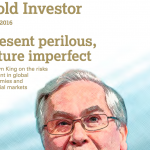Ex Bank of England president Mervyn King: Prepare portfolio to survive big event
 Since the publication of his book the End of Alchemy we knew the former Bank of England president Mervyn King does not longer believe in current monetary policies of creating money out of thin air.
Since the publication of his book the End of Alchemy we knew the former Bank of England president Mervyn King does not longer believe in current monetary policies of creating money out of thin air.
But in a recent interview for a publication of the World Gold Council he goes even further. Under the title ‘Misguided policies and economic risk’ he talks ‘frankly about Europe, global growth and how best to respond to the current uncertain climate.’
Here some of his statements (be sure you’re seated when reading);
-
“If we had too much spending and too much borrowing before the crisis and we have even more spending and borrowing now, then we’re moving further and further away from the point that we’ve got to get back to. So monetary policy is not only meeting diminishing returns, but it’s making the ultimate adjustment even bigger. It’s taking us in the wrong direction,”
“Monetary policy has reached its limits,” he says. “If you repeatedly bring down interest rates to try and persuade people to spend today rather than tomorrow, it works for a while. But they become increasingly resistant to being asked to spend their resources now rather than save for the future. And the longer domestic spending is in excess of potential output, the more you have to borrow from the rest of the world to finance it. Eventually people wake up to the fact that this is unsustainable and then you get a sharp adjustment downwards.“
“There is no easy way out. But I believe that first, we need explicitly to recognise that monetary policy is no longer the right approach. That’s not to say central banks should put up interest rates now. I think that would just lead to another downturn. But governments really have to do something to boost people’s beliefs in their future income, so they need to put in place a sustainable programme of improving productivity over the next 10 to 20 years.”
“Second, we need to tackle imbalances within and between economies so we need to move to much more flexible exchange rates. Part of the problem here has been the belief that fixing exchange rates was the right way to go and it’s just created massive imbalances both within Europe and between Asia and the West. That’s a big challenge in Europe, but it needs to be addressed.
“Third, there needs to be a sustained effort by the industrialised world to promote freer trade in services and not get bogged down in the Doha round, where the big emerging markets can hold us back.
“And fourth, we need a degree of international cooperation that has been absent since the spring of 2009. The IMF has not been active enough in promoting the need for this. But governments will have to recognise that it is very hard for any country to rebalance its economy unless others are doing so at the same time. Many countries have been trying to stimulate domestic growth by pushing their exchange rates down, but this is clearly counter- productive as it won’t work in aggregate,” he points out. So far, however, there are few signs of this spirit of cooperation. (needed for a monetary reset -WM)
King’s fears about economic prospects are arguably even gloomier when it comes to Europe.
“And the last option is to have a different configuration of membership of the euro area, in which the easiest outcome would be for Germany to leave. That could be temporary. They may not want to abandon the ultimate goal of monetary union, but I think the problem is that it is very hard to be explicit about that unless you are prepared to accept political union and no country has been prepared to do that yet,” King states.
He believes long-term asset managers should adopt a pragmatic approach to investment;
“If we don’t quite know what the future holds, there is little point in getting carried away by very fancy mathematical calculations of optimal portfolios. Don’t rely on past data to be a good guide. Try to think through what mix of assets gives you the best chance of surviving some big event. That must mean including assets that are negatively correlated or uncorrelated in your portfolio,” he says.
“And I am very struck by the fact that over many many years, central banks, governments and individuals have always, despite the protestations of economists, held some gold in their portfolio. Obviously, there is no high running return, but when unexpected things happen, particularly when governments rise and fall, then gold is a means of payment that everyone is always prepared to accept. And I think that’s why even central banks have always had a role in their portfolios for gold,” he adds. In recent years, many central banks in Asia and South America have been increasing the amount of gold in their portfolios. King believes this is a sensible approach. “I can understand why they feel that some proportion of their portfolio needs to be in gold.”
King also sees a role for gold as a hedge against (hyper)inflation;
“It’s still early days to conclude that around the world, governments have found the solution to maintaining price stability with a managed paper currency. We made real progress in the 1990s and early 2000s and a lot of countries went down that road and followed us. But hyperinflation has clearly not disappeared – the second biggest hyper-inflation in history was in Zimbabwe in this century – so I can understand why holding gold would seem to be a sensible part of a national portfolio. Because there is clearly a need to take some precautions against an unknowable future,” he says.
So there you have it guys (and girls). One of the most important former central bankers stating;
Current monetary policy doesn’t work any longer
Same applies for outdated financial models investors use
Hedge your risks buy buying gold to ‘survive some big event’ (a Big Reset


